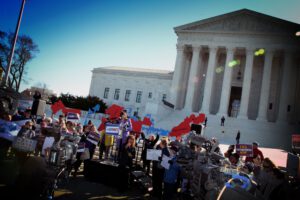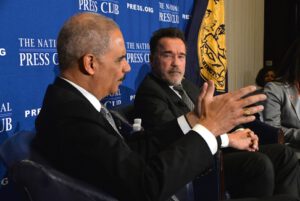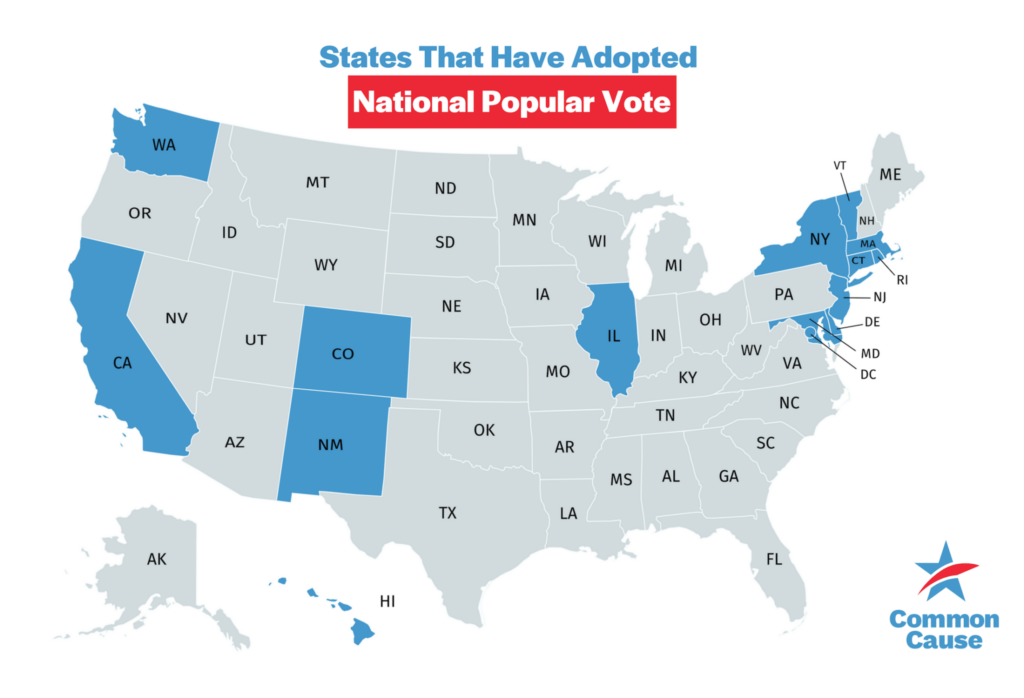Blog Post
Democracy In The States: April 2019
 Trends in Redistricting & Representation
Trends in Redistricting & Representation
U.S. Supreme Court hears historic challenges to partisan gerrymandering
 Last month, the U.S. Supreme Court heard oral arguments in a pair of cases challenging the constitutionality of partisan gerrymandering in North Carolina and Maryland. Rucho v. Common Cause challenges North Carolina’s GOP-drawn congressional map while Benisek v. Lamone challenges Maryland’s Democratic-drawn 6th congressional district. Read our top takeaways on why we are hopeful the court will do the right thing and strike down these maps as unconstitutional gerrymanders here.
Last month, the U.S. Supreme Court heard oral arguments in a pair of cases challenging the constitutionality of partisan gerrymandering in North Carolina and Maryland. Rucho v. Common Cause challenges North Carolina’s GOP-drawn congressional map while Benisek v. Lamone challenges Maryland’s Democratic-drawn 6th congressional district. Read our top takeaways on why we are hopeful the court will do the right thing and strike down these maps as unconstitutional gerrymanders here.
On the day of the oral arguments, activists from several democracy reform and progressive groups gathered outside the Supreme Court to rally for fair maps and hear from a bipartisan group of elected leaders, including former Governor Arnold Schwarzenegger (R-CA), Sen. Sheldon Whitehouse (D-RI), Gov. Larry Hogan (R-MD), Rep. Alan Lowenthal (D-CA), Rep. Tom Reed (R-NY), Rep. Alma Adams (D-NC), Rep. Andy Harris (R-MD), and Rep. Don Beyer (D-VA), along with representatives from Common Cause, the League of Women Voters, the Southern Coalition for Social Justice, the Arab American Institute, Greenpeace USA, and the Campaign Legal Center. The bipartisan rally underscores the fact that all voters are hurt by partisan gerrymandering and it is a problem that both parties deal with.
 After the Supreme Court heard oral arguments in the cases, former U.S. Attorney General Eric Holder and Schwarzenegger sat down to talk about the fight to end gerrymandering at the National Press Club. Watch the event here.
After the Supreme Court heard oral arguments in the cases, former U.S. Attorney General Eric Holder and Schwarzenegger sat down to talk about the fight to end gerrymandering at the National Press Club. Watch the event here.
States consider redistricting changes ahead of 2021
Local campaigns to reform the redistricting process continue in many states. In Virginia, the legislature recently took the first step in creating a bipartisan redistricting commission ahead of 2021. Other legislation to change the redistricting process is being considering in numerous states, including Minnesota, Pennsylvania, Oregon, North Carolina, and Nebraska.
 Trends in Voting & Elections
Trends in Voting & Elections
National Popular Vote sweeps the nation
Already in the 2019 sessions, Common Cause has helped pass the National Popular Vote (NPV) compact in three states: Colorado, New Mexico, and Delaware. All three bills have now been signed into law, meaning we are just 81 electoral votes away from enacting the compact and electing the next president by the national popular vote. NPV has also passed in the Oregon Senate and Nevada Assembly this year, and is expected to move in the other chambers in those states. Other active NPV campaigns continue in Maine and New Hampshire. Read more about the National Popular Vote compact.

States advance voting rights reform
States across the country are moving commonsense election reforms aimed at expanding and protecting voting rights, including in:
- New York: In the first item of legislative business in 2019, the New York legislature passed a series of voting reforms to greatly improve elections in New York. The push was a result of the multi-year campaign and organizing effort of the Let NY Vote coalition, led by Common Cause New York. The voting reforms already passed this session include establishing early voting opportunities, consolidating New York’s federal and state primary dates, pre-registration for 16 and 17 year olds, portable voter registration, and proposed constitutional amendments establishing same day voter registration and no excuse absentee voting. Plus, the 2019 New York state budget includes $14.7 million for electronic poll-books and $10 million for counties to implement early voting; almost exactly the combined $25 million the Let NY Vote coalition had requested. Work continues for other important election reform priorities, including automatic voter registration and voting rights for people on parole.
- New Mexico: In addition to passing the National Popular Vote compact and a series of money in politics and ethics reforms (see below), the New Mexico legislature ended their 2019 session by passing a voting rights reform package that includes automatic voter registration and same day registration. Read more about the New Mexico victories here.
- Delaware: The legislature has already sent a bill to Gov. Carney’s desk to finally establish early voting in Delaware. Additionally, legislation to establish same day voter registration is also moving.
- Hawaii: A number of different voting bills are moving in the Hawaii legislature, including pre-registration for 16 and 17 year olds, automatic voter registration, vote by mail, ranked choice voting, and automatic recounts.
- Colorado: The legislature is considering a bill to expand automatic voter registration in the state beyond the DMV to include those registering for Medicaid.
- Connecticut: Advocates including Common Cause Connecticut and the Connecticut Citizen Action Group are pushing the legislature to adopt and expand automatic voter registration.
- Washington: Gov. Jay Inslee recently signed the Native American Voting Rights Act into law, allowing the residential address portion of a voter registration form to be filled out with a nontraditional address.
- Nevada: After voters approved an automatic voter registration ballot measure in the 2018 elections, the legislature is now considering a same day voter registration bill.
- Kansas: Gov. Laura Kelly recently signed a bipartisan bill into law that gives counties the option to let voters cast ballots at any polling place in the county. It also requires election officials to try to contact voters if there’s a problem with their mail ballot signature and give them a chance to fix it.
- North Carolina: The House passed a bipartisan bill to increase voting access for college students and extend the deadline for universities to comply with the state’s new strict voter ID bill. The Senate is also expected to move the legislation.
But it hasn’t been all good news. In Texas, Republican legislators are advancing a billthat puts new unnecessary and harmful burdens on voters. In Florida, the legislature is moving a proposal that will weaken the implementation of a voter-approved ballot measure that returns the right to vote to people with felony convictions. In Iowa, Republican legislators blocked a constitutional amendment proposed by GOP Gov. Kim Reynolds to automatically restore felon voting rights. In Tennessee, the legislature is considering a bill that would chill grassroots voter registration drives. In Arizona, a bill to permanently purge some voters from the early voting list has passed the Senate and is pending in the House.
Multiple states attack the citizen initiative process
Karen Hobert Flynn, president of Common Cause, and Chris Melody Fields Figueredo, executive director of the Ballot Initiative Strategy Center, recently laid out the numerous attacks on the citizen initiative process in states across the country, including in Ohio, Florida, Missouri, North Dakota, Idaho, and Michigan. Read the new op-ed in USA Today here.
 Trends in Money & Influence
Trends in Money & Influence
States split on campaign finance disclosure
The New Mexico legislature passed and Governor Michelle Lujan Grisham signed a money in politics disclosure reform bill that will require organizations that spend more than $1,000 in non-statewide elections or $3,000 for statewide elections file reports, including donor information, with the Secretary of State. In neighboring Colorado, the legislature passed and Governor Jared Polis signed a similar law that expands disclosure requirements for groups that spend money between the end of a primary and the 60 days prior to the general election. Meanwhile in Mississippi, the legislature passed and Governor Phil Bryant signed a bill into law that creates a large loophole for dark money groups to avoid basic donor disclosure.
Oregon considering big money in politics reforms
Oregon – with leadership from Governor Kate Brown – is considering a comprehensive campaign finance reform package including a state constitutional amendment to allow greater regulation of money in politics, establishment of campaign contribution limits (Oregon currently has no limits), along with improved independent expenditure disclosure, and possibly a small donor public finance system. Read more here.
In Case You Missed It
- The For the People Act in the States: The U.S. House recently passed HR 1 (the For The People Act), the boldest and most comprehensive democracy reform legislation since the Watergate era. We looked at where some of the key campaign finance, voting, and redistricting reforms in the bill already passed at the state and local level. Read more here.
- New York LLC Loophole Overhaul: After years of organizing by good government watchdogs and democracy reform organizations, New York state has finally overhauled the “LLC loophole” by passing a bill subjecting LLCs to the same campaign finance laws all other corporations follow. Read more here.
- Article V Convention Threat: Former Wisconsin Governor Scott Walker (R) has joined one of the primary groups pushing for a new constitutional convention for a balanced budget amendment, which already has 28 out of the constitutionally required 34 states on board. A similar, but broader convention campaign, known as the Convention of States has already passed in three states this year (Arkansas, Utah, and Mississippi). Read more here.